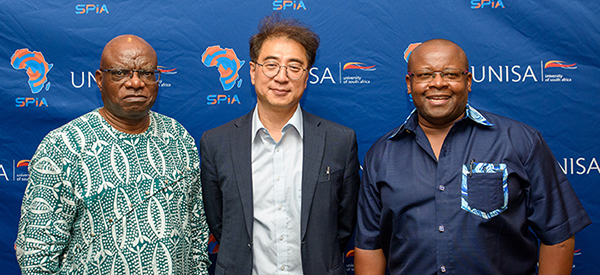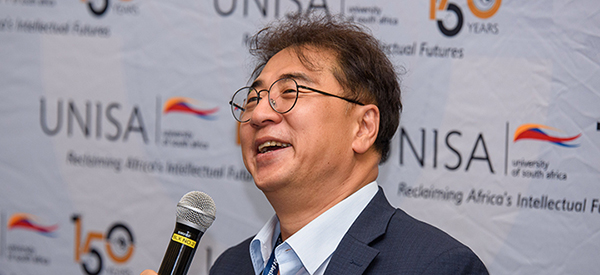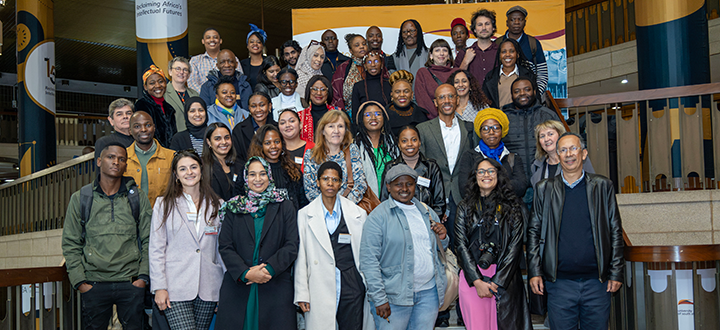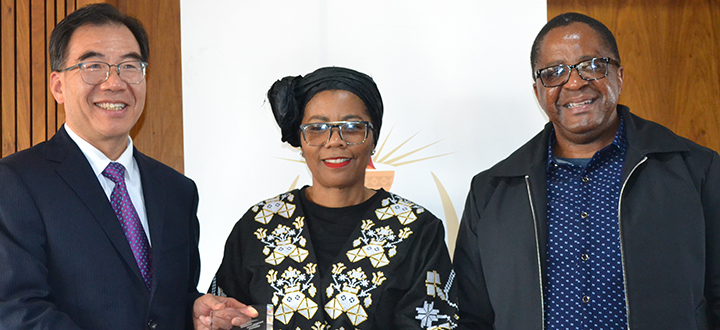College of College of Graduate Studies
New directions in social policy and alternative economies: Lessons from and for developing countries
Social policy scholars and policymakers from 22 African countries, along with two from North America and four from Europe, gathered at the fourth Social Policy in Africa Conference from 15 to 17 April 2024. The conference offered both scholarly engagement and the presentation of research findings on issues relating to the theme Social policy in post-Covid Africa: In search of an inclusive and equitable architecture.

Prof Jimi Adesina (Unisa), Dr Ilcheong Yi (UNRISD) and Dr Godwin Murunga (CODESRIA)
Expanding on the theme, emerging and established scholars explored a variety of topics, such as precarious financialisation; social security and the Covid-19 pandemic; education policy and post-covid education; informal social policy and the pandemic; social sciences, humanities, and arts research capacity; and leadership and funding in Africa.
Dr Ilcheong Yi of the United Nations Research Institute for Social Development (UNRISD) in Switzerland concluded the three-day engagement with a thought-provoking keynote address looking at New directions in social policy and alternative economies: Lessons from and for developing countries.
"Transforming our world: the 2030 Agenda for Sustainable Development, makes it very clear that we have to move away from business as usual in terms of production and consumption," stated Yi. He added that the agenda as a plan of action encourages us to design and implement economic relations and activities different from the mainstream economic relations and activities that have produced and reproduced extreme poverty, inequality and environmental degradation. As such, there have been an increasing number of ideas and practices of alternative economies focusing on various aspects of economic relations and activities like this.
New or alternative economies for sustainable development in discourse and practices
In his compilation of New Economies (circular, attention, creative, care, blue, social and solidarity, frugal innovation and green) for Sustainable Development, Yi stated that the economy should grow enough to meet the full spectrum of human needs but not so much that it outstrips the planet's ability to provide the resources for human civilisation.

Dr Ilcheong Yi
For many in the policy circles, Yi continued, inequality is still understood as an issue related to living standards, income and poverty alone. "We did not know or did not pay much attention to a comprehensive understanding of the multiple dimensions of inequality until recently."
Yi pointed out that the realisation of the multiple dimensions of inequality is a very recent phenomenon in terms of academic research. "If we have not paid much attention to multiple dimensions of inequality, and if our social policies have been designed and implemented with this incomplete understanding of inequality, we may have to ask ourselves whether our social policy itself is well equipped to deal with these multiple dimensions of inequalities."
"The term 'new' or 'innovative' attached to a policy carries at least two connotations, change and novelty," he says. These two connotations can be interpreted differently. At one extreme is their interpretation as successive improvements on existing products, processes and services, which are often called incremental changes. At the other extreme is a radical, systematic or transformative change that causes substantial shifts in organisational, social and cultural arrangements. Therefore, defining new or innovative practices or policies is often an exercise in choosing a normative position about the nature of policy change and its direction.
Although changes occur along a continuum – from incremental to radical – in policy reform, Yi indicated that scholars may be able to identify whether those changes are architectural, that is, changes within a policy regime or paradigm or transformative, that is, changes or transition from one policy regime or paradigm to another.
Considering these two issues, structural change involving both structure and agents and paradigmatic departure from the existing structure, we can gain some insights into how to judge a transformative change or transformation in social policy discourses and practices.
UNRISD, in its flagship report, suggested various pathways to transformation in policy terms. According to Yi, these pathways can give insights into identifying the transformative character of social policies along the lines of thinking about structural change and paradigmatic shift.
The first of these pathways is to reverse the dominant and normative hierarchy in policymaking. The second is to dismantle the patterns and processes of stratification related to factors such as class, gender, ethnicity, religion and location, which perpetuate vulnerabilities and inequalities. The third is strengthening universal and rights-based approaches. The fourth is embedding economic policies and activities in social and environmental norms. Finally, the fifth of these pathways is fostering genuinely participatory decision-making approaches involving all stakeholders in the transparent and democratic political processes.
Making social policy research synergistic with alternative economies
In closing, Dr Yi identified the following ways to make social policy research synergistic with alternative economies:
- Checking the appropriateness of social policy in addressing the key social questions of our society.
- Broadening social policy perspective to include new risks and new challenges.
- Recognising the need for a thorough examination and understanding of the linkages between social policy and other sectors.
- Ensuring that social policy pays much more attention to new technologies and tools, (ie how to utilise new technologies and tools in the key functions of social policy).
- Dealing, at the global level, with issues like climate change, inter-country inequality and power asymmetry between developed and developing countries.
* By Mpho Moloele, PR and Communications, Department of Research, Innovation & Commercialisation
Publish date: 2024-05-10 00:00:00.0


 Women drone pilots continue their journey in the skies
Women drone pilots continue their journey in the skies
 Black Planetary Studies takes centre stage at Unisa
Black Planetary Studies takes centre stage at Unisa
 Unisa concludes its milestone 150th anniversary on a high note
Unisa concludes its milestone 150th anniversary on a high note
 Empowering inclusive education: The role of ARCSWiD at Unisa
Empowering inclusive education: The role of ARCSWiD at Unisa
 Distinguished Unisa academic associate earns a global recognition for his research prowess
Distinguished Unisa academic associate earns a global recognition for his research prowess